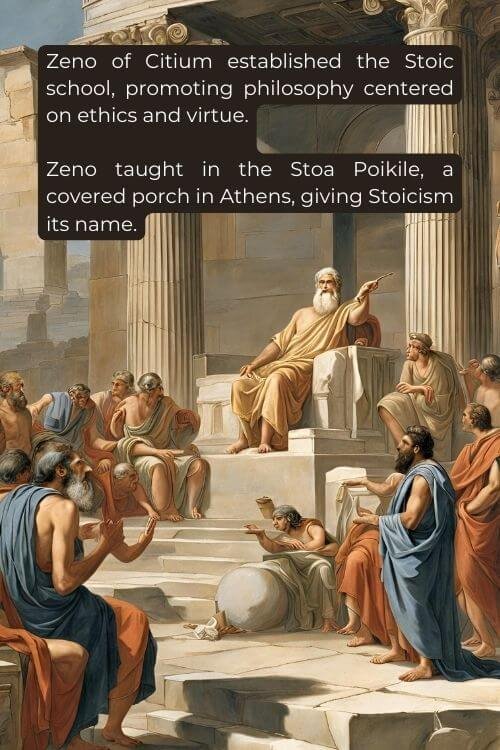Thales of Miletus
Zeno of Citium: The Father of Stoicism
Zeno of Citium (334 – 262 BCE) is celebrated as the founder of Stoicism, one of the most influential schools of philosophy in the ancient world.
His teachings on ethics, logic, and natural philosophy have shaped not only philosophical thought but also the moral framework of Western civilization.
This blog post explores Zeno’s life, including his birth, travels, early education, philosophical contributions, and the enduring impact of his ideas on subsequent generations.
Quick Read
Table of Contents
(1) Early Life and Education
Zeno was born in Citium, a city in Cyprus, around 334 BCE. His early life remains somewhat obscure, but it is believed that he was of merchant descent.
The influence of commerce may have imparted a practical outlook on life that would later permeate his philosophical ideas.
After the death of his father, Zeno was drawn to Athens, the epicenter of philosophical thought at the time.
He traveled to Athens around 300 BCE, where he sought to learn from the leading philosophers of the era.
Initially, Zeno studied under Crates of Thebes, a prominent Cynic philosopher, who influenced Zeno’s emphasis on virtue and the importance of living in accordance with nature.
Zeno’s early education was diverse, exposing him to various philosophical schools, including the Cynics and the Megarians.
However, it was during his interactions with the Academy and other schools that he began to develop his distinct philosophical system.

(2) Philosophical Development
Zeno’s philosophical career began earnestly when he founded his own school in Athens, known as the Stoa Poikile (Painted Porch), around 300 BCE.
This was a significant moment in philosophical history, as it marked the birth of Stoicism.
The name “Stoicism” derives from this location, where Zeno and his followers gathered to discuss philosophical ideas.
Zeno’s philosophy was characterized by a holistic approach, blending elements from various schools of thought.
He synthesized ideas from the Cynics, Plato, and the Heracliteans, creating a comprehensive system that emphasized ethics, logic, and physics. Key components of his philosophy include:
- Ethics and Virtue: Central to Zeno’s teachings was the idea that virtue is the highest good. He believed that living a virtuous life in accordance with nature leads to true happiness. For Zeno, virtue was synonymous with wisdom, and the virtuous person is one who acts rationally and ethically, guided by reason.
- Living in Accordance with Nature: Zeno advocated for living in harmony with nature, asserting that the universe is governed by rational principles. He emphasized the importance of understanding the natural order and aligning one’s life with it. This alignment fosters tranquility and resilience in the face of life’s challenges.
- Logos and Rationality: Zeno introduced the concept of Logos, the rational principle that pervades the universe. He believed that humans, as rational beings, have the capacity to comprehend and align themselves with the Logos. This understanding allows individuals to live in accordance with nature and achieve eudaimonia, or flourishing.
- Indifference to Externals: Zeno taught that external circumstances, such as wealth, health, and social status, are indifferent to happiness. Instead, true contentment comes from within and is derived from living a virtuous life. This notion laid the groundwork for the Stoic practice of emotional resilience and detachment from external outcomes.
- Knowledge and Logic: Zeno placed significant importance on logic as a means of acquiring knowledge. He believed that understanding the world requires a rational examination of concepts and ideas. Zeno’s logical framework influenced later Stoics and laid the foundation for the development of Stoic epistemology.
(3) Influence and Impact
Zeno’s influence extended far beyond his lifetime, shaping the course of Western philosophy and ethics.
His ideas laid the groundwork for the Stoic school, which flourished in the Hellenistic period and beyond. Some key aspects of Zeno’s influence include:
- The Stoic School: After Zeno’s death, his teachings were further developed by his followers, notably Cleanthes and Chrysippus. Chrysippus, in particular, played a pivotal role in systematizing Stoic philosophy and expanding its reach. The Stoic school became one of the dominant philosophical movements in the ancient world, influencing thinkers such as Seneca, Epictetus, and Marcus Aurelius.
- Ethics and Morality: Zeno’s emphasis on virtue and ethical living has had a lasting impact on moral philosophy. His ideas about the importance of living in accordance with nature and focusing on internal values resonate with contemporary ethical discussions. Modern ethical theories often draw on Stoic principles, emphasizing the cultivation of character and moral integrity.
- Psychology and Resilience: Zeno’s teachings have implications for psychology, particularly in the realm of resilience and coping strategies. The Stoic practice of focusing on what is within one’s control and accepting what cannot be changed has influenced cognitive-behavioral therapy (CBT) and modern approaches to mental health.
- Influence on Christianity: The early Christian thinkers engaged with Stoic philosophy, drawing parallels between Zeno’s ideas and Christian teachings. Concepts such as the importance of virtue, the value of inner peace, and the acceptance of fate found resonance in both Stoic and Christian thought, shaping the development of moral philosophy in the Western tradition.
- Legacy in Western Philosophy: Zeno’s contributions to philosophy have endured through the centuries, influencing a wide array of philosophical movements, including rationalism and existentialism. His emphasis on reason, ethics, and the pursuit of virtue continues to inspire philosophical inquiry today.
- Modern Stoicism: In recent years, there has been a resurgence of interest in Stoicism, with many people seeking its teachings as a guide to modern life. Zeno’s principles of rationality, emotional resilience, and the importance of virtue have found new relevance in the context of contemporary challenges, including stress, anxiety, and the quest for meaning.

(4) Conclusion
Zeno of Citium stands as a pivotal figure in the history of philosophy, whose teachings laid the foundation for Stoicism and influenced countless generations.
His emphasis on virtue, rationality, and living in accordance with nature provides a timeless framework for ethical living and personal development.
As we reflect on Zeno’s legacy, we recognize the enduring relevance of his ideas in our pursuit of happiness and fulfillment.
In a world often characterized by chaos and uncertainty, Zeno’s teachings encourage us to cultivate inner peace, focus on what we can control, and prioritize our values.
The principles of Stoicism, rooted in Zeno’s insights, remind us that true happiness is not dependent on external circumstances but rather emerges from within, through the practice of virtue, wisdom, and the nurturing of meaningful relationships.
As we navigate the complexities of modern life, Zeno’s philosophy serves as a guide, inspiring us to seek a life of purpose, resilience, and authentic happiness.
(A) 7 Quick Facts on Zeno of Citium
- Born in Citium – Zeno of Citium was born around 334 BCE in Citium, Cyprus.
- Traveled to Athens – He moved to Athens after a shipwreck, seeking knowledge and education.
- Studied under Crates – Zeno studied under the Cynic philosopher Crates of Thebes, influencing his ideas on virtue.
- Founded Stoicism – He established the Stoic school, promoting philosophy centered on ethics and virtue.
- Taught at the Stoa – Poikile Zeno taught in the Stoa Poikile, a covered porch in Athens, giving Stoicism its name.
- Emphasized Rationality – He believed in living according to nature and reason, valuing self-control and virtue.
- Influenced Later Philosophers – Zeno’s ideas laid the foundation for Stoicism, impacting philosophers like Seneca and Marcus Aurelius.
(B) 10 Quotes attributed to Zeno of Citium
- Man conquers the world by conquering himself. Emphasizing self-control as the key to true mastery.
- We have two ears and one mouth so that we can listen twice as much as we speak. Advocating for the value of listening and understanding over speaking.
- The good life is a life of virtue. Defining a meaningful existence as rooted in moral character.
- Happiness is a good flow of life. Suggesting that happiness arises from a well-lived life in accordance with nature.
- To be at peace with yourself, you must be at peace with others. Highlighting the importance of harmony in relationships for inner peace.
- It is not the things themselves that disturb us, but our opinions about them. Emphasizing the power of perception in shaping our experiences.
- The only thing that can be called good is virtue. Asserting that true goodness is found solely in virtuous actions.
- No evil is honorable, but death is honorable; therefore death is not evil. Suggesting that death, unlike evil, has a place in a virtuous life.
- A good character, endowed with virtue, will be as precious as gold. Stressing the intrinsic value of virtuous character over material wealth.
- Wisdom is the only thing that is truly good. Declaring wisdom as the ultimate source of goodness in life.








